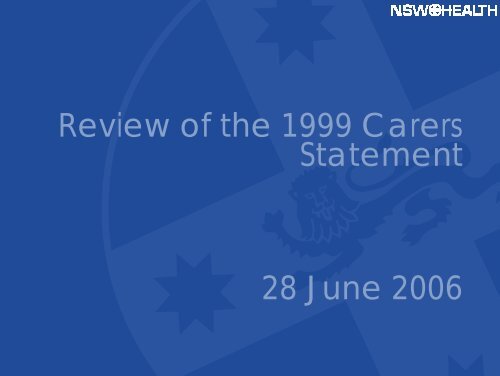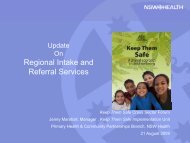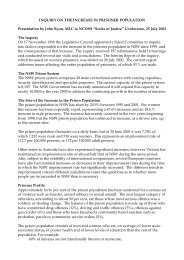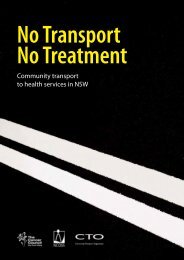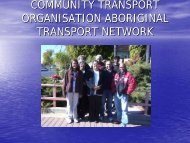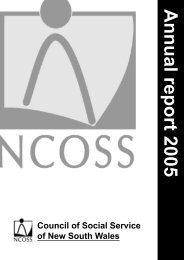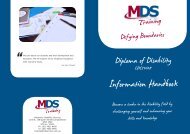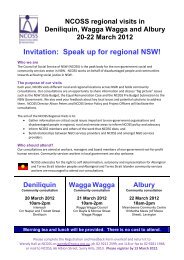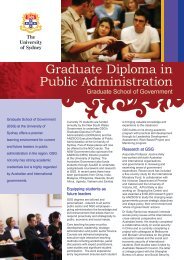Review of the 1999 Carers Statement 28 June 2006 - NCOSS
Review of the 1999 Carers Statement 28 June 2006 - NCOSS
Review of the 1999 Carers Statement 28 June 2006 - NCOSS
Create successful ePaper yourself
Turn your PDF publications into a flip-book with our unique Google optimized e-Paper software.
<strong>Review</strong> <strong>of</strong> <strong>the</strong> <strong>1999</strong> <strong>Carers</strong><br />
<strong>Statement</strong><br />
<strong>28</strong> <strong>June</strong> <strong>2006</strong>
Purpose <strong>of</strong> today<br />
! To inform you <strong>of</strong> <strong>the</strong> review <strong>of</strong> <strong>the</strong> <strong>1999</strong> <strong>Carers</strong><br />
<strong>Statement</strong><br />
! To discuss how carers can be supported in<br />
Aboriginal communities
Who is a carer ?<br />
! A carer is a family member, friend, neighbour or<br />
o<strong>the</strong>r community member who provides care and<br />
assistance to ano<strong>the</strong>r person<br />
! <strong>Carers</strong> provide assistance to o<strong>the</strong>rs including frail<br />
older people or people with disabilities, mental<br />
illness, people with dementia, people with a terminal<br />
illness, people living with HIV/AIDS, and people with<br />
a chronic illness.
What do carers do?<br />
! Practical help - feeding, bathing, dressing,<br />
toileting, transferring or administering<br />
medications.<br />
! Supervision.<br />
! Assistance with finances and transport.<br />
! Emotional support.
Who do carers care for?<br />
! <strong>Carers</strong> provide assistance to o<strong>the</strong>rs including<br />
frail older people, people with disabilities,<br />
mental health disorders, people with alcohol<br />
and o<strong>the</strong>r drug dependency, people with<br />
dementia, people with a terminal illness,<br />
people living with HIV/AIDS, and people with a<br />
chronic illness.
Why are carers important ?<br />
! Caring is a normal part <strong>of</strong> life. Most people expect to<br />
provide care to o<strong>the</strong>rs and receive care <strong>the</strong>mselves during<br />
<strong>the</strong>ir lives.<br />
! <strong>Carers</strong> improve <strong>the</strong> quality <strong>of</strong> life <strong>of</strong> <strong>the</strong> person <strong>the</strong>y care<br />
for and enable <strong>the</strong>m to remain <strong>the</strong> community.<br />
! <strong>Carers</strong> are <strong>the</strong> backbone <strong>of</strong> <strong>the</strong> community care system.<br />
! As well as <strong>the</strong> enormous social contribution, <strong>the</strong> economic<br />
value <strong>of</strong> caring has been increasingly recognised -<br />
replacement value <strong>of</strong> $30.5 billion nationally.
Aboriginal carers<br />
! 750,000 carers in NSW – 11% <strong>of</strong> population.<br />
! <strong>Carers</strong> NSW estimates that <strong>the</strong>re are at least 15,000<br />
Aboriginal and Torres Strait Islander carers in NSW.<br />
! Aboriginal and Torres Strait Islander people may be more<br />
likely to be involved in caring - extended nature <strong>of</strong> family<br />
and community relationships.<br />
! Aboriginal carers may experience additional barriers to<br />
support.
The NSW <strong>Carers</strong> <strong>Statement</strong><br />
! The NSW <strong>Carers</strong> <strong>Statement</strong> was released in<br />
October <strong>1999</strong> by NSW Health and <strong>the</strong> former<br />
Ageing and Disability Department<br />
! It invited comment on priorities for funding.<br />
! The program developed is now known as <strong>the</strong><br />
NSW <strong>Carers</strong> Program with $5.1 million annual<br />
budget<br />
! NSW Health is <strong>the</strong> budget holder and works<br />
closely with DADHC in implementation.
Why does <strong>the</strong> <strong>Statement</strong> need<br />
updating?<br />
! Whole <strong>of</strong> Government approach<br />
! Development in o<strong>the</strong>r States<br />
! Need for greater recognition and commitment<br />
to carers.
What do carers want?<br />
! Relevant information<br />
! Emotional support<br />
! Respite<br />
! Education and training<br />
! Services that are flexible and appropriate<br />
! Increased financial assistance<br />
! Recognition and respect
Current Carer Support<br />
! Informal support - from family, friends,<br />
neighbours, work colleagues and o<strong>the</strong>r carers.<br />
! Formal services - directed at carers and/or to <strong>the</strong><br />
person whom <strong>the</strong>y are caring for, provided under<br />
a wide range <strong>of</strong> state and federally funded<br />
programs.
! Peer support, support groups<br />
Carer services<br />
! Information about illness, services available<br />
! Services for person needing care<br />
! Respite<br />
! Counselling<br />
! Benefits, entitlements, employment<br />
! Equipment , skills development<br />
! Advocacy
NSW <strong>Carers</strong> Program<br />
! NSW <strong>Carers</strong> Program - $5.1 million<br />
– Carer Support Services<br />
– Non Government Organisations carer grants<br />
– Mental Health Family and <strong>Carers</strong> Program<br />
– Young <strong>Carers</strong> Project
Carer support for Aboriginal carers<br />
National<br />
! Commonwealth Carer Resource Centre<br />
! National Carer Counselling Program<br />
– Workshops<br />
! Aboriginal <strong>Carers</strong> Support Kits<br />
! Aboriginal carer support worker in <strong>Carers</strong> NSW
Carer support for Aboriginal carers<br />
NSW<br />
! Aboriginal Home Care<br />
! Aboriginal Coordinator position in <strong>Carers</strong> NSW<br />
! Koori Carer Yarning Project<br />
! Aboriginal events in <strong>Carers</strong> Week<br />
! Carer grants in NSW <strong>Carers</strong> Program<br />
! Carer Support Groups<br />
! Demonstration project - Mental Health
Possible issues<br />
! Identifying as carers<br />
! Linking to mainstream support services<br />
! Culturally appropriate information and service delivery
Questions for discussion<br />
! Identifying as a carers – how does that happen?<br />
! Caring is diverse – are <strong>the</strong>re particular issues that<br />
Aboriginal carers share?<br />
! What are <strong>the</strong> current barriers?<br />
! How can Aboriginal carers be supported ?


